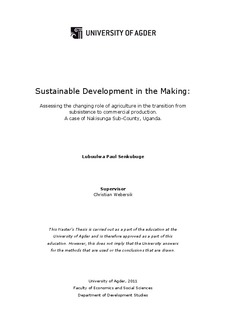| dc.contributor.author | Senkubuge, Lubuulwa Paul | |
| dc.date.accessioned | 2011-10-12T07:12:13Z | |
| dc.date.available | 2011-10-12T07:12:13Z | |
| dc.date.issued | 2011 | |
| dc.identifier.uri | http://hdl.handle.net/11250/135203 | |
| dc.description | Master thesis in development management- University of Agder 2011 | en_US |
| dc.description.abstract | Sustainable development has become a catch phrase in almost all global development
agendas. With more than 60% of Africa’s active labour force earning a livelihood in the
agricultural sector (World Bank 2011; UNEP 2007), progress in the agricultural sector is
prioritized as key to attainment of sustainable development for different countries in Africa.
This study considered how a state-authored plan to transform the majorly subsistence
agriculture into commercial agriculture, was being implemented in five parishes of Nakisunga
Sub-County in Mukono, district of Uganda. This largely qualitative study involved
interviewing farmers, their leaders and coordinators of the state programme. The study
generally established that the changing role of agriculture hinges around the state’s
agricultural development plans being able to address contextual factors that challenge peasant
farmers in the transition from subsistence agriculture to commercial production. The key
contextual factors requiring attention include: dynamics of marketing amidst globalization;
poverty, gender, cultural and land dynamics in production/marketing; preconditions regarding
the use of participation as a management strategy; and finally the possibility of using a mix of
traditional and scientific knowledge in the pursuit of sustainability. Such contextual issues
would better be addressed using emancipatory farmer education taking place within an
environment of fully functioning state institutions as watch dogs for accountability at all
stages. The current decentralization system in Uganda’s local governance and the irrigation
potential availed by rivers would further engrain agriculture as the indispensible key in
unlocking sustainable development in Nakisunga or Africa in general. Finally, the study
recommends further research into possibilities of using a mix of traditional and scientific
knowledge as a way of improving subsistence agriculture to promote sustainable development for poor countries in Africa. | en_US |
| dc.language.iso | eng | en_US |
| dc.publisher | Universitetet i Agder; University of Agder | en_US |
| dc.subject.classification | UT 503 | |
| dc.title | Sustainable development in the making : assessing the changing role of agriculture in the transition from subsistence to commercial production. A case of Nakisunga Sub-County, Uganda | en_US |
| dc.type | Master thesis | en_US |
| dc.subject.nsi | VDP::Social science: 200::Social anthropology: 250 | en_US |
| dc.source.pagenumber | 93 s. | en_US |
